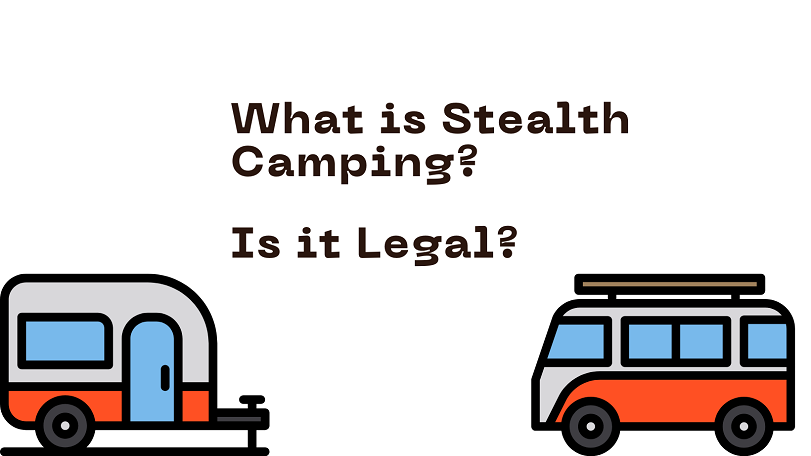Looking to camp for free and under the radar? Then stealth camping may be for you! As an adventurous travel blogger, I enjoy the thrill and freedom of stealth camping when I’m road tripping or vanlife-ing across the country.
Let’s dive into everything you need to know about this unique style of urban camping and how to do it right.
What is Stealth Camping?
Stealth camping, also called ninja camping or urban camping, basically means camping in your vehicle in locations not designated for camping, and staying undetected. You want to avoid being hassled or fined for unlawful camping on private or restricted public land.
The key is finding free parking or open space to camp as inconspicuously as possible, and not drawing attention to yourself. This gives RVers, vanlifers, and car campers more options to camp for free in or near cities.
Why Stealth Camp?
Besides the obvious perk of free lodging, stealth camping offers these benefits:
- More options to camp near cities & amenities
- Avoid crowded, noisy campgrounds
- Park conveniently right by activities/events
- Beat high hotel costs
- Flexibility & spontaneity in trip planning
- Parking autonomy if camping restrictions
- Blend in and enjoy quiet night’s rest
For those comfortable camping in their vehicle, stealth camping opens up many possibilities for saving money while getting good sleep near urban attractions.
How to Stealth Camp Successfully
Mastering the art of stealth camping requires strategy and effort. Follow these tips:
- Use blackout curtains and reflectix to cover windows
- Ensure no belongings are visible from outside
- Park inconspicuously out of the way of others
- Arrive later at night and leave early morning
- Check reviews & tips on locating potential spots
- Have a backup plan if you get asked to move
- Obey all parking laws and signs
- Avoid noise, light, or activity that draws attention
- No camping gear, chairs, grills, etc. set up outside
- Use restroom facilities discreetly
- Practice good hygiene & waste disposal methods
- Don’t overstay your welcome, move every few days
- Blend in and be respectful of the area
Being intentional in how you camp, park, and conduct yourself helps avoid unwanted encounters when stealth camping.
Where to Stealth Camp
Get creative when scouting potential stealth camping locations in urban areas. Some options:
- Residential streets in inconspicuous vehicles
- Big box store parking lots (with permission)
- Roadside pull offs, scenic overlooks
- Hospital/business complexes
- Ports, marinas, public docks (check rules)
- Church or community center lots
- Park & ride commuter lots
- Secret BLM & USFS dispersed sites
- Urban beaches, lakes, recreational areas
- University campuses (if allow overnight parking)
- Casino parking garages
Apps like iOverlander and FreeRoam help crowdsource useful tips on stealth camping spots. Always double check legality and respect private property.
Stealth Camping Essentials
To camp successfully without detection, be sure you have:
- Blackout curtains for privacy
- Reflectix covers for windows
- Low light battery & USB powered lights
- Ventilation fan & screens
- No generator – use solar or precharge devices
- Self-contained bathroom setup
- Water jugs & greywater tank
- Inconspicuous vehicle with tinted windows
- Pillows, blankets, comfy sleeping setup
- Food prep equipment like cooler, camp stove
- Entertainment like books, music, laptop
Having the right stealth gear and rig helps you camp anywhere without compromising comfort.
Stealth Camping Etiquette
To maintain the privilege of stealth camping always remember:
- Never litter – pack out what you pack in
- Keep noise and activity low or non-existent
- Do not set up camping furniture or equipment outside
- Use bathroom facilities when possible
- Obey all parking regulations
- Avoid problematic behaviors
- Be discreet entering and exiting your rig
- Don’t wear pajamas or camping clothes outside
- Leave no trace – take trash with you
- Move locations every few days
- Blend in with your surroundings
- Stay safe and responsible
Being respectful of communities helps preserve stealth camping access for everyone.
Is Stealth Camping LEGAL?
That’s an important question when it comes to stealth camping. The legality can be a bit of a gray area and varies between different cities and jurisdictions. Here are some key factors to consider:
- In most places, it is illegal to camp or sleep overnight in any public area that is not an designated campground. This includes parking lots, rest stops, streets, etc.
- Many cities have laws prohibiting sleeping in vehicles overnight, mainly to prevent homelessness issues. Fines can be steep if caught.
- National forests, BLM land, and some state/city parks do allow dispersed camping for free, but you still need to follow rules.
- Private property owners, businesses, etc. have the right to ask you to leave or have you towed. Always get permission if possible.
- Camping signs, parking restrictions, and other posted notices should be obeyed. Don’t assume you can camp anywhere.
- Try to be inconspicuous, quiet, leave no trace, and move locations every few days. But avoiding detection is never guaranteed.
- If asked by an official to move on, be cooperative and polite. Arguing your case is unlikely to help.
The bottom line is stealth camping has an element of civil disobedience to it. While some towns turn a blind eye, you can potentially face citations and fines if caught. It’s best to research local laws and use your best judgment to camp responsibly. But the legal risk is part of the appeal for some adventurous campers.
Let me know if you have any other great stealth camping tips and spots in the comments. Happy ninja camping!
